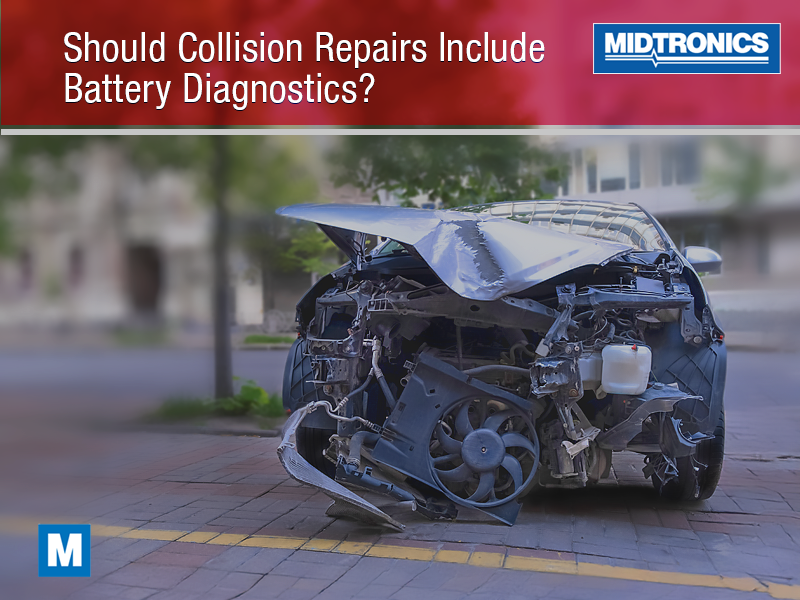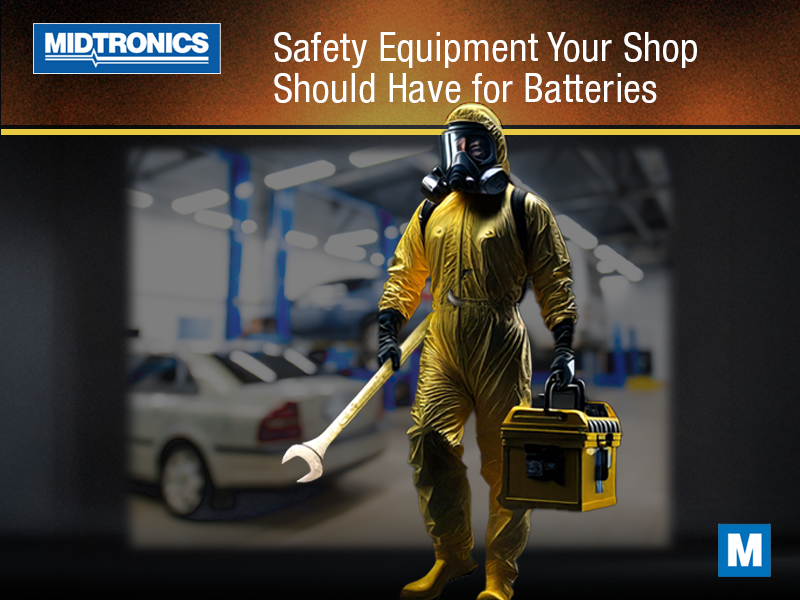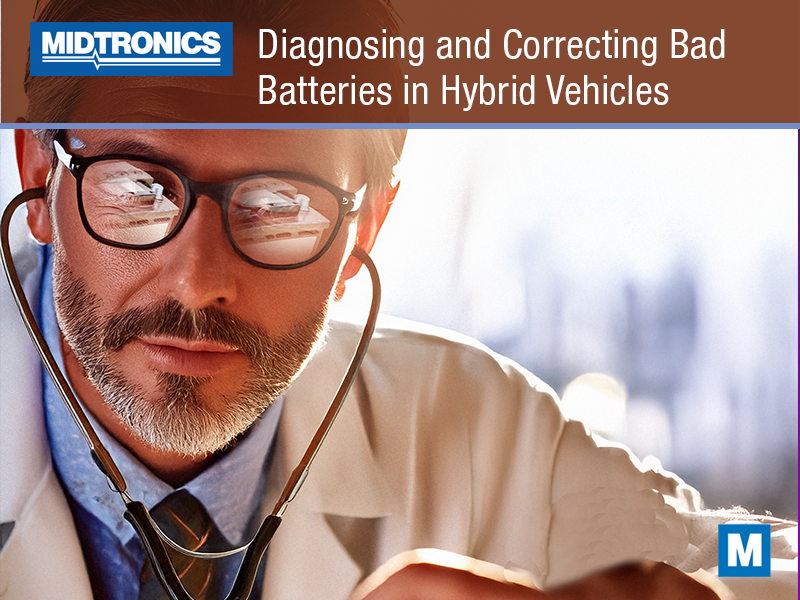When a vehicle is involved in a collision, the primary focus often lies on repairing visible damage, such as dents, broken parts, and suspension, and paint. However, beneath the surface lies a aspect of the vehicle’s health that tends to be neglected at the body shop: the battery.
As vehicles become increasingly reliant on complex electronic systems, battery diagnostics have become an essential component of collision repairs. Here, we explore the top reasons why collision repair shops need to incorporate battery diagnostics into their standard practices.
Failures from Sitting Unused
Between insurance companies, their adjusters, and the busy workflow in the collision repair shop, it’s not uncommon for a vehicle to take weeks or even months to reach completion. All that time, the battery has the opportunity to completely discharge. Wiring may have been damaged in the accident also, and a short to ground could severely deplete the battery – an issue that could be avoided if the repair was dealt with right away.
Storing the battery on a lot with the battery depleted shortens its lifespan and allows for sulfation, and it may not be recoverable. These problems are exacerbated when the accident happens in either an extremely cold climate or an excessively hot one.
Testing the battery when it arrives at the repair shop, then once again before it’s returned to the customer, allows the repair shop to track its condition and ensure that their practices haven’t contributed to the degradation. What’s more, it provides an opportunity to proactively address the battery’s condition with the insurer.
Identifying Hidden Electrical System Damage
Collisions often result in more than visible damage. Hidden issues, particularly within the vehicle’s electrical system, can lead to significant problems down the road if not addressed. Wiring harnesses, connectors, and modules linked to the battery are vulnerable to impact damage, even if the battery itself appears intact.
Battery diagnostics allow repair technicians to identify these underlying issues. Modern diagnostic tools can communicate with the vehicle’s onboard systems to pinpoint faults that are otherwise undetectable through visual inspection. For example, a minor collision could cause a short circuit or weaken a battery’s ability to hold a charge, symptoms that might not appear until days or weeks after the repair. Proactively addressing these issues saves time and money for both the repair shop and the vehicle owner while ensuring the reliability of the vehicle.
Preventing Future Breakdowns and Repairs
A compromised battery that goes undiagnosed after a collision significantly increases the risk of future breakdowns. Vehicle owners may find themselves stranded with a dead battery or dealing with persistent electrical faults, which can lead to additional repair costs and dissatisfaction with the initial repair work.
Including battery diagnostics in the repair process minimizes these risks. By detecting and addressing battery-related issues upfront, repair shops can help vehicle owners avoid the inconvenience of unexpected failures. This proactive approach not only ensures a smoother post-repair experience but also boosts the reputation of the repair shop as a provider of high-quality, thorough service.
Industry data underscores the importance of preventative maintenance. Studies show that many vehicles returning to repair shops for follow-up services after a collision have undiagnosed electrical issues. Addressing these problems early through battery diagnostics enhances vehicle reliability and reduces the likelihood of repeat visits.
Supporting Advanced Vehicle Technologies
The rise of electric vehicles , hybrids, and advanced internal combustion engine vehicles has revolutionized automotive technology. These vehicles rely heavily on batteries to power not only the drivetrain but also an every-growing number of sophisticated systems such as ADAS, infotainment, and energy management systems.
Collisions involving EVs or hybrids have an even greater detrimental impact on battery systems, posing unique challenges for repair technicians. For example, the high-voltage batteries used in these vehicles may sustain damage that is not immediately visible and may not appear to affect performance. Without proper testing, this damage can compromise the vehicle’s safety and how it performs in the days, weeks, and months after the repair.
Going further, many advanced technologies require precise calibration and a stable power supply to function correctly. A damaged or improperly functioning battery can interfere with these systems, leading to reduced efficiency or even safety risks. Battery diagnostics play a crucial role in ensuring that these high-tech components are restored to their original state after a collision, providing peace of mind to vehicle owners.
Enhancing Customer Trust and Repair Quality
Incorporating battery diagnostics into collision repairs sends a clear message to customers: their safety and satisfaction are the repair shop’s top priorities. Offering this service demonstrates a commitment to thorough, high-quality repairs, helping shops differentiate themselves in a competitive market.
For repair shops, the benefits extend beyond customer trust. In-depth battery tests reduce the likelihood of complaints and comeback claims by ensuring vehicles leave the shop in peak condition. Customers who experience fewer post-repair issues are more likely to return for future services and recommend the shop to others.
A case in point: A repair shop in a busy metropolitan area began offering battery diagnostics as part of its standard collision repair package. Customers reported higher satisfaction rates, citing the shop’s attention to detail and commitment to preventing future problems. This led to increased business through referrals and repeat customers, proving that investing in advanced diagnostics pays off in both reputation and revenue. It even provided an opportunity to sell new batteries that were aging, not just related to the insurance claim.
Conclusion
Battery diagnostics are no longer optional in collision repairs – they are a necessity. From ensuring vehicle safety and identifying hidden electrical issues to preventing breakdowns, supporting advanced technologies, and building customer trust, the benefits are clear. As vehicles become more reliant on complex electrical systems, repair shops must evolve to meet these demands.
Collision repair shops that incorporate battery testing into their services not only enhance the quality of their work but also strengthen their reputation as trusted experts in collision repair. By prioritizing battery health, repair professionals can ensure that every vehicle leaves their shop ready to face the road ahead with confidence.




